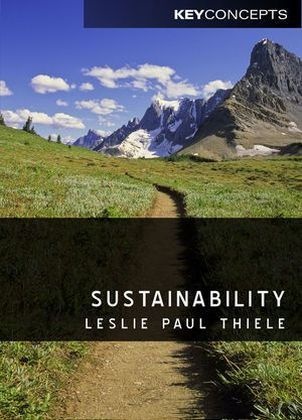Read more
Informationen zum Autor Leslie Paul Thiele is professor of political science and director of sustainability studies at the University of Florida. Klappentext The pursuit of sustainability has generated lifestyle changes for individuals across the globe, widespread initiatives within civil society and business, historic policies for municipal, regional, and national governments, and crucial protocols and agreements by international organizations. Increasingly, sustainability provides a common language and goal for diverse peoples and nations. Yet the meaning of sustainability remains unsettled, and the term frequently serves as a PR strategy--a green veneer for business as usual--rather than a driver of fundamental change.Leslie Paul Thiele's accessible yet thorough book provides a broad-ranging introduction to the concept and practice of sustainability today. It addresses the history, scope, and contested meanings of sustainability as an ethical ideal, an ascendant ideology, and a common sense approach to living in an ever more crowded world of increasingly scarce resources. Key topics covered include environmental health and ecological resilience, the promise and unintended consequences of technology, political and legal challenges, economic limits and opportunities, and cultural change.Unlike most other approaches to this crucial topic, Thiele argues that sustainability requires innovation and adaptation as much as the conservation of resources. His book will be a valuable resource for students in a broad range of courses, including environmental studies and related areas, as well as general readers keen to grapple with one of the most pressing issues of our times. Inhaltsverzeichnis * Acknowledgments* Preface* Introduction* Chapter One: Sustainability and Time* Chapter Two: The Geography of Sustainability* Chapter Three: Ecological Resilience and Environmental Health* Chapter Four: Technological Solutions and their Problems* Chapter Five: The Political and Legal Challenge* Chapter Six: Sustaining Economies* Chapter Seven: Culture and Change* Conclusion* Bibliography* Notes ...
List of contents
Preface vii
Acknowledgments ix
Introduction 1
1 Sustainability and Time 13
2 The Geography of Sustainability 39
3 Ecological Resilience and Environmental Health 65
4 Technological Solutions and Their Problems 90
5 The Political and Legal Challenge 115
6 Sustaining Economies 142
7 Culture and Change 168
Conclusion 194
Notes 200
Select Bibliography 218
Index 230
Report
Winner of the Choice award for Outstanding Academic Title
"A valuable resource for students in a broad range of courses, including environmental studies and related areas, as well as general readers keen to grapple with one of the most pressing issues of our times."
Biotechnology, Agronomy, Society and Environment
"This is the most readable book about sustainability I know. Leslie Paul Thiele has synthesized a vast and complex set of ideas and made them coherent and accessible. Anyone wishing to know what sustainability is all about should read this book."
Robert Costanza, Portland State University
"Non-sustainability has become the very condition of our existence on this planet, whether it be ecological, economic or social. The search for sustainability is a survival imperative. But sustainability is an amoeba word which can mean what we want it to mean. Thiele's book takes us beyond semantic debates to take up the challenge of adaptation and change. As he puts it, sustainability can only be pursued by way of cultural creativity grounded in learning. "
Vandana Shiva

